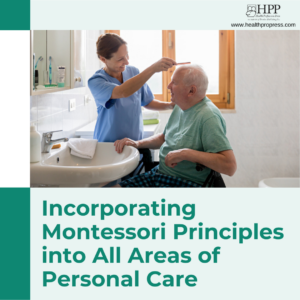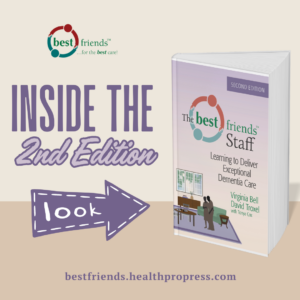
Dementia Care at a Distance
The COVID-19 crisis is taking a heavy toll on all of us, particularly family and professional care partners. Visitors are prohibited in most residential care communities; this is necessary but certainly can be distressing to families and persons with dementia. Even when we are together, we are told to stay six feet apart.
The very phrase “social distancing” is the opposite of the Best Friends™ Approach and what we want in quality dementia care. In many ways, socialization is the treatment for dementia. Social distancing (and lots of handwashing) is necessary to ensure good public health practices, but can we add something to the mix? When we practice dementia care at a distance, can we demonstrate affection, kindness, and reassurance in other ways?
Here are some recommendations:
#1 Whether you are a staff person or a home care partner, help reduce fear and anxiety by protecting people with dementia from ongoing negative, even frightening, news. It’s tempting to leave news on 24/7. But for someone with dementia a small worry can blow up into a state of acute anxiety. Turn off the news – or watch it judiciously.
#2 Stay positive. Create a feeling that all is well. Try to leave your worries at the door. Smile. Spend time outside if it’s sunny. Tell jokes and funny stories. Nurture a positive therapeutic environment by listening to music or watching a funny movie. Music can change moods and turn emotions around. Put on some lively C&W music or fun music representing the staff’s culture. Now more than ever, it’s a good time to dance. And you can dance 6 feet apart!
#3 No visitors allowed? Draw on the Life Story to create moments of happiness. If Burt loves hot sauce, make sure he gets a bottle with his eggs. If mom plays the piano, help her get settled at the keyboard with some music. (Wipe down the keys later with your Clorox wipes.) What kind of words will comfort and reassure people cut off from family and friends?
#4 How can you use Facebook Live, What’s App, FaceTime, or Zoom to connect with friends and family who can’t visit? The Colorado Alzheimer’s Association recently held a virtual happy hour over Zoom—and they drank Quarantinis!! Be creative! With so much tech at our fingertips, there are endless ways to stay connected. Do your best to be calm and reassuring and share some funny stories or positive news (adopting a rescue dog, baking an apple pie).
#5 Think about what you can do for others. Bake biscuits for a local animal shelter? Crochet blankets for the homeless? Do something for the many people whose jobs have vanished overnight? Like all of us, people with dementia need to feel needed. And focusing on others can help us look beyond our own worries.
#6 Look for ways to support one another. Be kind. Practice forgiveness and show our appreciation for others for the great job they’re doing. We’ve been hearing about family members delivering bakery cupcakes, donuts and cookies for staff. If your family member is in residential care, ask if you can drop off some of his or her favorite snacks or foods.
#7 Lots of amazing materials are being streamed right now. Maybe it’s time to change the mood by watching an old movie musical like Easter Parade, “visiting” a favorite art museum online, or watching a free streaming program from a local or national symphony.
And on a personal note, this is a tough time for all of us involved in caregiving. Day centers and other key services are shutting down, it’s not easy or advisable to take a Costco run for supplies, and social distancing means that your usual support system (or coffee with friends) is on hold. Lower your anxiety by doing your best to focus on things you can control vs. the unknown. Read some favorite spiritual passages or prayers. Memorize a poem. Enjoy your favorite music. Exercise and get out of doors if possible. Watch some comedies on Netflix. Take an online course. Breathe! All of these things can recharge your batteries and keep you strong until the world returns to normalcy.
Virginia Bell and David Troxel
Authors of The Best Friends™ Approach to Dementia Care
bestfriendsapproach.com
Learn about the Best Friends™ approach!
 What people experiencing memory loss need most of all is someone dedicated to helping them feel safe, secure, and valued—at all stages of the disease. Adopting the internationally acclaimed Best Friends™ approach to dementia care helps professional and family care providers gain the skills and confidence needed for this critical role.
What people experiencing memory loss need most of all is someone dedicated to helping them feel safe, secure, and valued—at all stages of the disease. Adopting the internationally acclaimed Best Friends™ approach to dementia care helps professional and family care providers gain the skills and confidence needed for this critical role.
Learn more about Best Friends™ products, training, and additional services at bestfriends.healthpropress.com.





Add comment